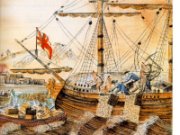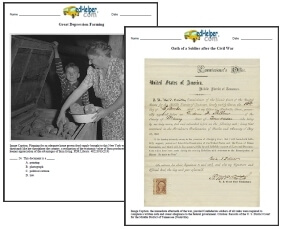
Worksheets and No Prep Teaching Resources
Reading Comprehension Worksheets
American Revolution

American Revolution
 Worksheets and No Prep Teaching Resources Reading Comprehension Worksheets American Revolution |
 American Revolution |
| edHelper's suggested reading level: | grades 6 to 8 | |
| Flesch-Kincaid grade level: | 6.47 |
|
The Boston Tea Party
By Jane Runyon |

|
 1 King George III and his advisor Lord Townshend needed to raise money to put into the dangerously low British coffers. Money was being spent faster than it could be brought in. There were wars to support. There were government buildings to be constructed. There was a royal lifestyle to be maintained. The general population of England had no more money to give to the government. They were poor and getting poorer. Many were sent to debtors' prison because they couldn't pay their bills. There had to be a way to bring revenue to the treasury without causing more hardship on the citizens of Britain.
1 King George III and his advisor Lord Townshend needed to raise money to put into the dangerously low British coffers. Money was being spent faster than it could be brought in. There were wars to support. There were government buildings to be constructed. There was a royal lifestyle to be maintained. The general population of England had no more money to give to the government. They were poor and getting poorer. Many were sent to debtors' prison because they couldn't pay their bills. There had to be a way to bring revenue to the treasury without causing more hardship on the citizens of Britain. |
Create Weekly Reading Books
Prepare for an entire week at once! |
| Leave your feedback on The Boston Tea Party (use this link if you found an error in the story) |
 |
American Revolution
|
 |
United States
|
|
|
 | Fifty States Theme Unit |
 |
Document Based Activities |